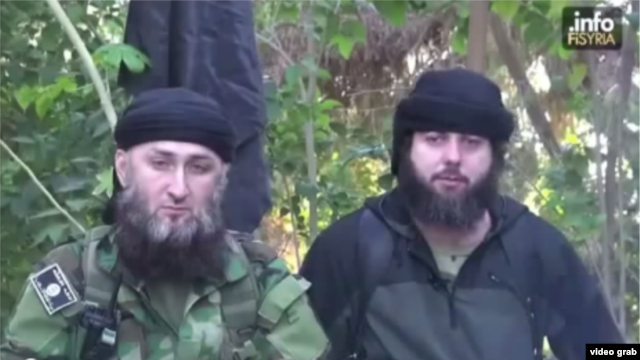Russia: U.S. sanctions North Caucasus militants for IS recruiting efforts
| Publisher | Radio Free Europe/Radio Liberty |
| Publication Date | 5 October 2015 |
| Cite as | Radio Free Europe/Radio Liberty, Russia: U.S. sanctions North Caucasus militants for IS recruiting efforts, 5 October 2015, available at: https://www.refworld.org/docid/56813c2715.html [accessed 2 June 2023] |
| Disclaimer | This is not a UNHCR publication. UNHCR is not responsible for, nor does it necessarily endorse, its content. Any views expressed are solely those of the author or publisher and do not necessarily reflect those of UNHCR, the United Nations or its Member States. |
October 05, 2015
By Mike Eckel and Joanna Paraszczuk
 Akhmed Chatayev (right) appeared in a video released in February with Islam Seit-Umarovich Atabiyev, aka Abu Jihad.
Akhmed Chatayev (right) appeared in a video released in February with Islam Seit-Umarovich Atabiyev, aka Abu Jihad.
WASHINGTON – The United States has hit two North Caucasus militants involved in recruiting fighters for the Islamic State (IS) group with new financial sanctions, as Washington and others countries struggle to fight the success of similar recruiting efforts.
Also listed by the U.S. Treasury Department in its announcement on October 5 was a North Caucasus man believed to be involved in recruiting for another Islamist group in Syria.
The sanctions come as the United States, Russia, and countries across Europe have tried to come up with a successful strategy to fight the flood of people who have sought to the IS group in Syria and Iraq, where the radical militants have seized vast territory.
Both the United States and Russia hosted high-level conferences during the United Nations General Assembly meetings last week, trying to brainstorm ideas to keep recruiters from radicalizing young people in particular. The United Nations also expanded its blacklist of Al-Qaeda-linked people last week.
By some estimates, more than 30,000 foreigners have traveled to the Middle East to join the IS group. Russian officials have said as many as 2,400 Russian citizens have joined, with most coming from Chechnya and the troubled North Caucasus, along with people from Central Asia.
One of the men listed as a "specially designated national" by the Treasury Department was Islam Seit-Umarovich Atabiyev, who also goes by Abu Jihad. Atabiyev, who was mistakenly identified as a Chechen, is an ethnic Karachai who is responsible for Furat Media, the Russian-language media arm for the IS group.
Also listed was Akhmed Chatayev, a Chechen who appeared alongside Atabiyev in a video apparently shot in Syria that circulated on social media earlier this year. Chatayev is also believed to have been involved in recruiting fighters for IS.
The third man, Zaurbek Guchayev, who uses the alias Abdul Aziz, was believed to be involved with a group called the Caucasus Emirate, which was set up eight years ago in Russia's North Caucasus as the heir to the long-running Chechen insurgency there. Guchayev apparently played a role with the Caucasus Emirate's official affiliate in Syria, which is a rival to IS group.
Caucasus Emirate militants, many of whom are Chechens, have fought in battlefield alliances with another group, Jabhat al-Nusra, which is Al-Qaeda's affiliate in Syria and which is also a rival to IS.
The Caucasus Emirate itself was sanctioned by the Treasury Department in 2011.
There are growing fears in Moscow and elsewhere that the flood of Chechens, Uzbeks, and others into Syria could ultimately spawn a new insurgency back in Russia, as recruits gain battlefield experience.
Some analysts have said Russia's own military deployment and air strikes in Syria are likely aimed not only at propping up the Syrian regime, but also targeting Chechen fighters there.
Since the September 11, 2001, terrorist attacks, the United States has aggressively used financial sanctions to go after Al-Qaeda and other terrorist networks and their funding sources, though a growing number of experts have increasingly questioned their effectiveness.
Link to original story on RFE/RL website
